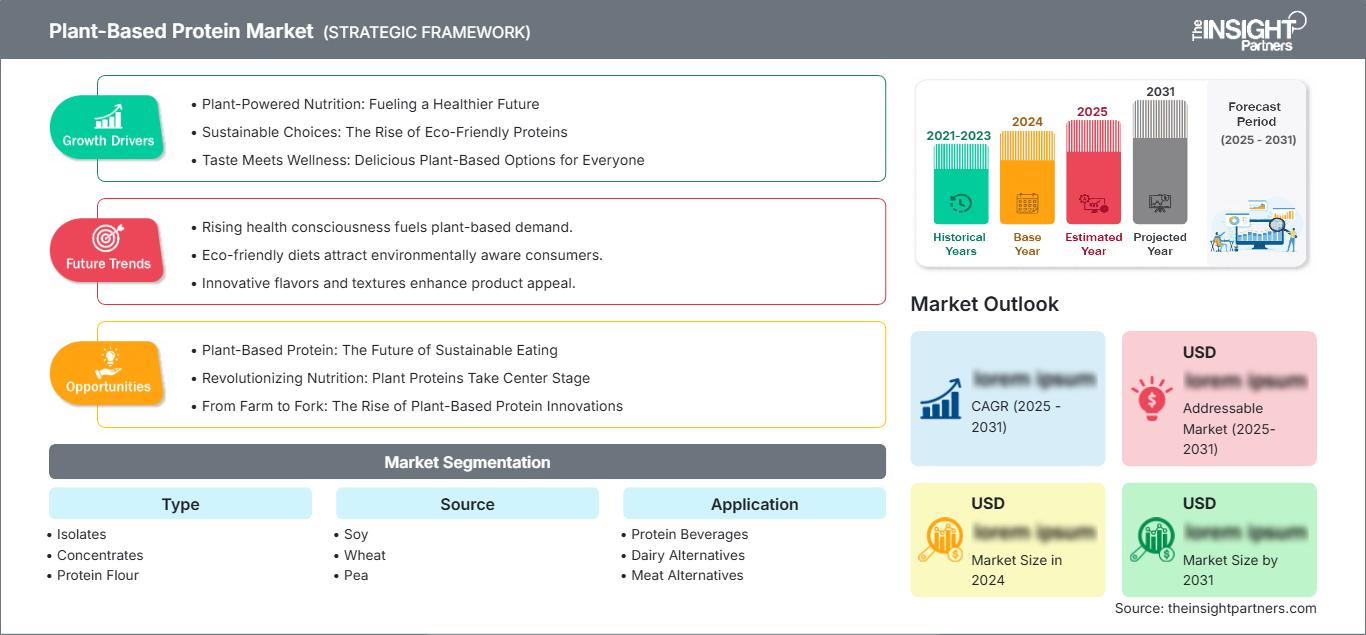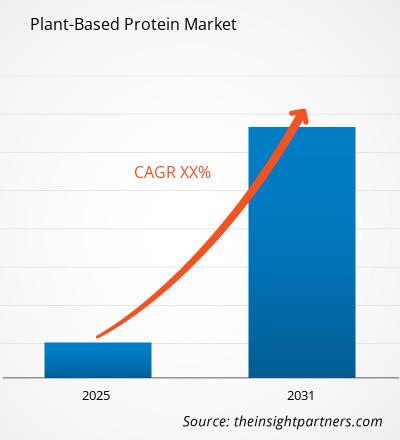Plant-Based Protein Market Size, Share, and Growth Analysis by 2031
Historic Data: 2021-2023 | Base Year: 2024 | Forecast Period: 2025-2031Coverage: Plant-Based Protein Market covers analysis by Type (Isolates, Concentrates, Protein Flour); Source (Soy, Wheat, Pea, Others); Application (Protein Beverages, Dairy Alternatives, Meat Alternatives, Protein Bars, Bakery Product, Nutrition Supplements, Sports Nutrition, Others) , and Geography (North America, Europe, Asia Pacific, and South and Central America)
- Report Date : Feb 2026
- Report Code : TIPRE00010706
- Category : Food and Beverages
- Status : Upcoming
- Available Report Formats :


- No. of Pages : 150
The Plant-Based Protein Market is expected to register a CAGR of XX% from 2025 to 2031, with a market size expanding from US$ XX million in 2024 to US$ XX Million by 2031.
The report is categorized by Type (Isolates, Concentrates, Protein Flour) and further analyzes the market based on Source (Soy, Wheat, Pea). It also examines the market by Application (Protein Beverages, Dairy Alternatives, Meat Alternatives, Protein Bars, Bakery Product, Nutrition Supplements, Sports Nutrition) . A comprehensive breakdown is provided at global, regional, and country levels for each of these key segments.
The report includes market size and forecasts across all segments, presenting values in USD. It also delivers key statistics on the current market status of leading players, along with insights into prevailing market trends and emerging opportunities.
Purpose of the Report
The report Plant-Based Protein Market by The Insight Partners aims to describe the present landscape and future growth, top driving factors, challenges, and opportunities. This will provide insights to various business stakeholders, such as:
- Technology Providers/Manufacturers: To understand the evolving market dynamics and know the potential growth opportunities, enabling them to make informed strategic decisions.
- Investors: To conduct a comprehensive trend analysis regarding the market growth rate, market financial projections, and opportunities that exist across the value chain.
- Regulatory bodies: To regulate policies and police activities in the market with the aim of minimizing abuse, preserving investor trust and confidence, and upholding the integrity and stability of the market.
Plant-Based Protein Market Segmentation
Type
- Isolates
- Concentrates
- Protein Flour
Source
- Soy
- Wheat
- Pea
Application
- Protein Beverages
- Dairy Alternatives
- Meat Alternatives
- Protein Bars
- Bakery Product
- Nutrition Supplements
- Sports Nutrition
You will get customization on any report - free of charge - including parts of this report, or country-level analysis, Excel Data pack, as well as avail great offers and discounts for start-ups & universities
Plant-Based Protein Market: Strategic Insights

-
Get Top Key Market Trends of this report.This FREE sample will include data analysis, ranging from market trends to estimates and forecasts.
Plant-Based Protein Market Growth Drivers
- Plant-Powered Nutrition: Fueling a Healthier Future
- Sustainable Choices: The Rise of Eco-Friendly Proteins
- Taste Meets Wellness: Delicious Plant-Based Options for Everyone
Plant-Based Protein Market Future Trends
- Rising health consciousness fuels plant-based demand.
- Eco-friendly diets attract environmentally aware consumers.
- Innovative flavors and textures enhance product appeal.
Plant-Based Protein Market Opportunities
- Plant-Based Protein: The Future of Sustainable Eating
- Revolutionizing Nutrition: Plant Proteins Take Center Stage
- From Farm to Fork: The Rise of Plant-Based Protein Innovations
Plant-Based Protein Market Regional Insights
The regional trends and factors influencing the Plant-Based Protein Market throughout the forecast period have been thoroughly explained by the analysts at The Insight Partners. This section also discusses Plant-Based Protein Market segments and geography across North America, Europe, Asia Pacific, Middle East and Africa, and South and Central America.
Plant-Based Protein Market Report Scope
| Report Attribute | Details |
|---|---|
| Market size in 2024 | US$ XX million |
| Market Size by 2031 | US$ XX Million |
| Global CAGR (2025 - 2031) | XX% |
| Historical Data | 2021-2023 |
| Forecast period | 2025-2031 |
| Segments Covered |
By Type
|
| Regions and Countries Covered |
North America
|
| Market leaders and key company profiles |
|
Plant-Based Protein Market Players Density: Understanding Its Impact on Business Dynamics
The Plant-Based Protein Market is growing rapidly, driven by increasing end-user demand due to factors such as evolving consumer preferences, technological advancements, and greater awareness of the product's benefits. As demand rises, businesses are expanding their offerings, innovating to meet consumer needs, and capitalizing on emerging trends, which further fuels market growth.

- Get the Plant-Based Protein Market top key players overview
Key Selling Points
- Comprehensive Coverage: The report comprehensively covers the analysis of products, services, types, and end users of the Plant-Based Protein Market, providing a holistic landscape.
- Expert Analysis: The report is compiled based on the in-depth understanding of industry experts and analysts.
- Up-to-date Information: The report assures business relevance due to its coverage of recent information and data trends.
- Customization Options: This report can be customized to cater to specific client requirements and suit the business strategies aptly.
The research report on the Plant-Based Protein Market can, therefore, help spearhead the trail of decoding and understanding the industry scenario and growth prospects. Although there can be a few valid concerns, the overall benefits of this report tend to outweigh the disadvantages.
Habi is a seasoned Market Research Analyst with 8 years of experience specializing in the Chemicals and Materials sector, with additional expertise in the Food & Beverages and Consumer Goods industries. He is a Chemical Engineer from Vishwakarma Institute of Technology (VIT) and has developed deep domain knowledge across industrial and specialty chemicals, paints and coatings, paper and packaging, lubricants, and consumer products. Habi’s core competencies include market sizing and forecasting, competitive benchmarking, trend analysis, client engagement, report writing, and team coordination—making him adept at delivering actionable insights and supporting strategic decision-making.
- Historical Analysis (2 Years), Base Year, Forecast (7 Years) with CAGR
- PEST and SWOT Analysis
- Market Size Value / Volume - Global, Regional, Country
- Industry and Competitive Landscape
- Excel Dataset
Testimonials
The Insight Partners' SCADA System Market report is comprehensive, with valuable insights on current trends and future forecasts. The team was highly professional, responsive, and supportive throughout. We are very satisfied and highly recommend their services.
RAN KEDEM Partner, Reali Technologies LTDsI requested a report on a very specific software market and the team produced the report in a few days. The information was very relevant and well presented. I then requested some changes and additions to the report. The team was again very responsive and I got the final report in less than a week.
JEAN-HERVE JENN Chairman, Future AnalyticaWe worked with The Insight Partners for an important market study and forecast. They gave us clear insights into opportunities and risks, which helped shape our plans. Their research was easy to use and based on solid data. It helped us make smart, confident decisions. We highly recommend them.
PIYUSH NAGPAL Sr. Vice President, High Beam GlobalThe Insight Partners delivered insightful, well-structured market research with strong domain expertise. Their team was professional and responsive throughout. The user-friendly website made accessing industry reports seamless. We highly recommend them for reliable, high-quality research services
YUKIHIKO ADACHI CEO, Deep Blue, LLC.This is the first time I have purchased a market report from The Insight Partners.While I was unsure at first, I visited their web site and felt more comfortable to take the risk and purchase a market report.I am completely satisfied with the quality of the report and customer service. I had several questions and comments with the initial report, but after a couple of dialogs over email with their analyst I believe I have a report that I can use as input to our strategic planning process.Thank you so much for taking the extra time and making this a positive experience.I will definitely recommend your service to others and you will be my first call when we need further market data.
JOHN SUZUKI President and Chief Executive Officer, Board Director, BK TechnologiesI wish to appreciate your support and the professionalism you displayed in the course of attending to my request for information regarding to infectious disease IVD market in Nigeria. I appreciate your patience, your guidance, and the fact that you were willing to offer a discount, which eventually made it possible for us to close a deal. I look forward to engaging The Insight Partners in the future, all thanks to the impression you have created in me as a result of this first encounter.
DR CHIJIOKE ONYIA MANAGING DIRECTOR, PineCrest Healthcare Ltd.Reason to Buy
- Informed Decision-Making
- Understanding Market Dynamics
- Competitive Analysis
- Identifying Emerging Markets
- Customer Insights
- Market Forecasts
- Risk Mitigation
- Boosting Operational Efficiency
- Strategic Planning
- Investment Justification
- Tracking Industry Innovations
- Aligning with Regulatory Trends




















 Get Free Sample For
Get Free Sample For